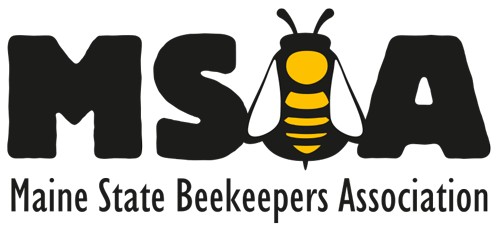Note: The links on this page are provided as a convenience to beekeepers and do not constitute an endorsement.
SUPPLIES
MSBA Beekeeping Resources – includes a list of Maine suppliers of beekeeping equipment, queens, honey bee packages and nucs, maintained by the Maine State Beekeepers Association.
Spicer Bees – Whitefield
The Honey Exchange – Portland
Backwoods Bee Farm– Windham
Swan’s Honey – Albion
Humble Abodes – Windsor
TECHNIQUE
Maine State Bureau of Agriculture, Apiary Program – Apiary License Application and other Information
Eastern Apicultural Society – The Eastern Apicultural Society of North America is an international nonprofit educational organization founded in 1955 for the promotion of bee culture, education of beekeepers, certification of Master Beekeepers and excellence in bee research. EAS is the largest noncommercial beekeeping organization in the United States and one of the largest in the world.
Bee Source– Articles, papers, and an active forum for discussion of all things bees.
Maine Cooperative Extension – Beekeeping information and classes provided by the University of Maine Cooperative Extension.
Scientific Beekeeping – Randy Oliver, American Bee Journal author, entomologist and commercial beekeeper, offers a science-based alternative to “an internet and popular press full of conflicting opinions and questionable advice.” He conducts his own research about practical beekeeping applications, including mite treatments. His Beginners Pages offer novices a guide to the first year of beekeeping.
Honey Bee Suite – A blog, online articles, and beginner’s advice that focuses on bees and the issues that are currently affecting their survival.
Honey Bee Health Coalition‘s mission is to improve honey bee health by addressing multiple factors influencing bee health, including hive pests and disease, forage and nutrition, and exposure to crop pesticides. Its Varroa Management Decision Tool – guides you through the decisions needed to determine how best to manage varroa mites in your hives.
Bee Informed Partnership is a national collaboration of leading research labs and universities in agricultural science to better understand honey bee declines. Supported initially by the USDA and the National Institute of Food and Agriculture, BIP became a nonprofit in 2014 to continue working with beekeepers to better understand how we can manage healthier bees. BIP conducts the valuable national Loss and Management Survey each year.
University of Guelph – A YouTube page for the University of Guelph Bee Research Center.
Ontario Beekeepers Association, Technology Transfer Program The mandate of the TTP is to conduct research for Ontario’s beekeeping industry, to facilitate a honey bee breeding program in Ontario and to transfer information, skills and methodologies to the beekeepers.
University of Florida Honey Bee Research & Extension Lab The mission of HBREL is to advance our understanding of managed honey bees and wild bees in Florida, the US and globally, with a goal of improving the health and productivity of bee pollinators everywhere.
DIY Plans
Screened Bottom Board – Instructions for building a screened bottom board.
Winter Candy Board Feeder – Instructions for building a candy-board feeder for over-wintering hives.
How to Wrap a Hive – How to wrap a beehive with felt paper for winter.

